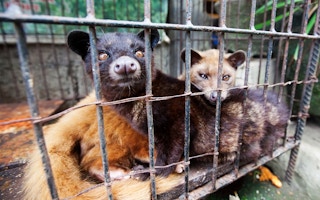If you’re a coffee connoisseur, you’ve probably heard of kopi luwak — the world’s most expensive coffee, made from partially digested coffee beans, excreted by a shy, forest-dwelling, cat-like animal called the common palm civet (Paradoxurus hermaphroditus).
Civet coffee is thought to have a unique taste. The civet’s digestive juices ferment the coffee beans, some experts claim, adding a nutty — and a highly prized — flavour to them. A cup of this luxury coffee can cost between $30 and $100 in the U.S.
Traditionally, people made this coffee using coffee beans collected from civet droppings in the wild. But the rising popularity of kopi luwak has meant that civets are increasingly being removed from the wild and held in captivity to mass-produce the gourmet coffee.
Consequently, numerous small kopi luwak plantations with captive civets have cropped up in Indonesia and southeast Asia in the last few years to attract tourists.
Caged civets on these plantations, however, tend to live in very poor conditions that fail to meet basic animal welfare requirements, a new study published in the journal Animal Welfare has found.
On assessing the housing conditions of 48 caged civets in 16 civet coffee plantations close to Bali in Indonesia, researcher Neil D’Cruze from Oxford University’s Wildlife Conservation Research Unit, and his colleagues from the non-profit World Animal Protection in London, found that all the plantations had very poor civet housing conditions.
In most plantations, civets were housed in small cages that greatly restricted the animals’ movements, the team observed. The cages typically had wire flooring, were barren with no form of natural substrate or vegetation that civets are used to in the wild, and had little access to natural light. The cages were also filthy, lined by old and new feces and urine.
Some of these conditions were alarming, D’Cruze told Mongabay. “The wire mesh flooring in some situations can be extremely painful — they can cause sores and abrasions over time when there are no other platforms or refuge provided.”
In the wild, palm civets feed on an omnivorous diet, the authors write, consuming plants, fruits, nuts and insects. But most caged civets in Bali’s coffee farms were being fed unnatural diets, comprising mainly of coffee cherries, the team found. Moreover, many civets had no access to clean water, and had little contact with other civets.
Now, palm civets are solitary animals. But even solitary animals interact with other individuals in the wild, the authors write, and these interactions are essential and instinctive for reproductive purposes.
“
Despite the elaborate and clever marketing (for example, that civets choose the ripest coffee cherries and that their unique gut biota serves to alter the chemical structure so that it has a superior taste) most genuine coffee aficionados agree that in reality Civet Coffee is a gimmick and that it does not actually have a superior taste.
Neil D’Cruze, researcher, Oxford University Wildlife Conservation Research
Despite the visibly poor conditions of the civets and their enclosures, “majority of tourists seemed oblivious to the cruelty involved in the civet coffee plantations that they visited,” D’Cruze said. “We witnessed people taking photos (including selfies) of the animals in their cages,” he added.
All of the caged civets had most likely been caught from the wild, and then caged in the plantations to mass produce coffee on-site, the team found. The animals were also big tourist attractions, some tour guides told the researchers, simply because “many international tourists do not know what a palm civet looks like.”
Additionally, civet coffee was popular among tourists because of “superior taste”, the tour guides said. But D’Cruze is suspicious of this claim.
“My understanding is that despite the elaborate and clever marketing (for example, that civets choose the ripest coffee cherries and that their unique gut biota serves to alter the chemical structure so that it has a superior taste) most genuine coffee aficionados agree that in reality Civet Coffee is a gimmick and that it does not actually have a superior taste,” he said. “Personally, I have tried civet coffee sourced from the wild — although it is less bitter it is not superior in my opinion and definitely not worth the $100 price tag it usually bears here in London.”
The common palm civet is currently classified as Least Concern under the IUCN Red List. But conservationists fear that the increasing demand for this “fashionable coffee” is driving the proliferation of civet coffee farms that house caged civets poached from the wild, which may eventually have considerable impact on wild civet populations.
“I would say the main take home message is — as a tourist — not to visit any civet coffee plantation where you can see civets in cages,” D’Cruze said. “This is a sure fire sign that there a animal welfare and conservation concerns involved. Rather, if you must taste civet coffee, visit a coffee plantation where the civet coffee is made using scat collected from the wild. This at least as the potential of contributing to local tourism in non harmful way.”
Co-author Jan Schmidt-Burbach of the World Animal Protection added that “detecting cruel civet coffee usually remains a constant challenge because of the difficulty in distinguishing between caged and wild source beans. However, if tourists see civets in cages as part of their tour this is a clear indication that unnecessary animal abuse is involved.”
This story was published with permission from Mongabay.








